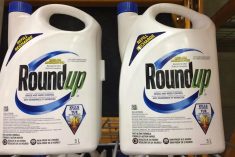Reuters — A federal judge overseeing lawsuits alleging Bayer’s glyphosate-based Roundup herbicide causes cancer on Monday tentatively allowed pieces of controversial evidence that the company had hoped to exclude from upcoming trials.
U.S. District Judge Vince Chhabria during a hearing in San Francisco federal court called his decision “probably most disappointing for Monsanto,” the Bayer unit that manufactures the world’s most widely used herbicide.
The company denies allegations that glyphosate causes cancer and says decades of independent studies have shown the chemical to be safe for human use.
Read Also

U.S. Supreme Court to hear Bayer’s bid to curb Roundup cases
The U.S. Supreme Court agreed on Friday to hear Bayer’s bid to sharply limit lawsuits claiming that the company’s Roundup weedkiller causes cancer and potentially avert billions of dollars in damages.
Chhabria on Monday said plaintiffs could introduce some evidence of Monsanto’s alleged attempts to ghostwrite studies and influence the findings of scientists and regulators during the first phase of upcoming trials. He said documents which showed the company taking a position on the science or a study introduced during the first phase were “super relevant.”
The company had hoped the judge would take a harder line on such evidence following a Jan. 3 order by Chhabria restricting evidence of corporate misconduct. At the time, that decision lifted Bayer’s shares nearly seven per cent.
Monsanto had argued much of this evidence was a “sideshow” that would only distract jurors from the scientific evidence.
Plaintiffs’ lawyers contended some evidence of corporate misconduct was inextricably linked to their scientific claims.
The judge appeared to agree with them, saying it was difficult to draw the line between scientific evidence and allegations of corporate misconduct, and questioned whether it would be fair for the jury to not hear about the company’s alleged attempts to influence scientists.
The parties did agree that other internal documents, including emails of Monsanto employees discussing lobbying efforts, do not belong in the initial trial phase.
Under Chhabria’s order, that evidence would be allowed only if glyphosate was found to have caused plaintiff Edwin Hardeman’s cancer and the trial proceeded to a second phase to determine Bayer’s liability.
The order applies to Hardeman’s case, which is scheduled to go to trial on Feb. 25, and two other upcoming cases. There are some 620 Roundup cases before Chhabria, out of more than 9,300 nationwide.
Plaintiffs’ lawyers believe corporate misconduct evidence was critical to a California state court jury’s August decision to award US$289 million in a similar case. The verdict sent Bayer shares tumbling at the time, though the award was later reduced to US$78 million and is under appeal.
— Tina Bellon reports on product liability law for Reuters in New York.















